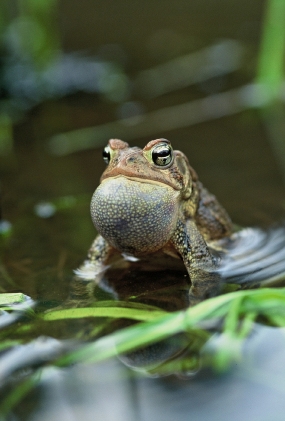
“Dear Tech Serv,
We would like to detect DNA collected from swabs rubbed on the inside thighs of frogs. What would be the best DNA extraction kit to use for this?”
“Hi Tech Serv,
I need to find out a suitable kit for extracting DNA from bird fecal samples. Can I use ReliaPrep™ gDNA Tissue Miniprep System for that?”
These are just some examples of unconventional sample type inquiries that the Promega Technical Services Team receives regularly from scientists around the world. Many of these inquiries land in the hands of Technical Services Scientist, Paraj Mandrekar (a.k.a. “sample type guru”).
Before Paraj joined the Technical Services Team, he had 15 years of R&D experience in working with all kinds of sample types, especially those involved in forensic casework. Need to extract DNA from blood on denim, leather, cotton sheet or carpet? How about saliva on envelopes or cigarettes? He’s your guy. Once, he was asked to isolate DNA from deer blood in a plastic bag with the deer’s head and vomit—definitely not your everyday sample. He was able to modify the purification method to get the job done. (Somewhere, he has an acknowledgment in an article about deer populations.)
When Paraj joined Technical Services, he took on the task of building a formal training module for Technical Advising in Nucleic Acids. This training was designed to help other technical services scientists identify which features of a method will best fit specific sample types. So when you call (or live chat, or email) Tech Serv about your favorite (sometimes crazy) sample type, they will know which kit to recommend and suggest modifications if needed.
And we have a lot of genomic DNA purification kits.

We have kits designed specifically for sample types such as mouse tails, food samples, plant leaves and seeds, whole blood, FFPE tissue samples and bacteria DNA from food samples. Some kits are suitable for a large variety of sample types. For example, the Wizard® Genomic DNA Purification Kit works for all kinds of samples, including beetles, frog skin, fish fins and antelope blood. If you’re dealing with a larger number of samples, we also have a collection of kits that work with our Maxwell® RSC Instruments—compact, automated nucleic acid purification platforms that can process up to 16 samples (Maxwell® RSC 16) or 48 samples (Maxwell® RSC 48) at once.
Odds are, no matter what sample type you work with, we have the right kit for you—and we will help you find it. If you have questions about which kit to use for your sample, please don’t hesitate to contact our Technical Services Team.
What unconventional samples have you worked with? Tell us about them!

Related Posts
Updated 3/20/21
Latest posts by Johanna Lee (see all)
- Microfluidic Organoids Could Revolutionize Breast Cancer Treatment - March 25, 2025
- Bacteria From Insect Guts Could Help Degrade Plastic - January 28, 2025
- A Diabetes Drug, Metformin, Slows Aging in Male Monkeys - December 19, 2024

Can the extraction kit be modified to work with bird blood samples?
Hello Iman, I will contact technical services and have them reply to your question. Thanks for asking. Michele
The Wizard Genomic DNA kit can be used to isolate DNA from avian blood samples. We have not tested this in-house before, though there are many examples of this application in the literature with a wide variety of bird species. In all cases authors followed the standard protocol for gDNA isolation from whole blood described in the manual (#TM050).
• Belo, N. O., Pinheiro, R. T., Reis, E. S., Ricklefs, R. E., & Braga, E. M. (2011). Prevalence and lineage diversity of avian haemosporidians from three distinct cerrado habitats in Brazil. PLoS One, 6(3), e17654. https://doi.org/10.1371/journal.pone.0017654
• Mijares, A., Rosales, R., & Silva-Iturriza, A. (2012). Hemosporidian parasites in forest birds from Venezuela: genetic lineage analyses. Avian Diseases, 56(3), 583-588. https://doi.org/10.1637/10058-011312-ResNote.1
• Roos, F. L., Belo, N. O., Silveira, P., & Braga, E. M. (2015). Prevalence and diversity of avian malaria parasites in migratory Black Skimmers (Rynchops niger, Laridae, Charadriiformes) from the Brazilian Amazon Basin. Parasitology research, 114(10), 3903-3911. https://link.springer.com/article/10.1007/s00436-015-4622-9
• Belo, N. O., Passos, L. F., Júnior, L. M. C., Goulart, C. E., Sherlock, T. M., & Braga, E. M. (2009). Avian malaria in captive psittacine birds: detection by microscopy and 18S rRNA gene amplification. Preventive veterinary medicine, 88(3), 220-224. https://doi.org/10.1016/j.prevetmed.2008.09.007
• Silveira, P., Belo, N. O., Lacorte, G. A., Kolesnikovas, C. K., Vanstreels, R. E., Steindel, M., … & Braga, É. M. (2013). Parasitological and new molecular-phylogenetic characterization of the malaria parasite Plasmodium tejerai in South American penguins. Parasitology international, 62(2), 165-171. https://doi.org/10.1016/j.parint.2012.12.004
If you have any additional questions, please let us know or contact our Technical Services Scientists directly at: https://www.promega.com/support/tech-support/
I would like to know, is there a reported protocol for DNA extraction from salmon stool samples or from some fish, using the wizard genomic DNA purification kit? I’ll look forward for your answer.
We would recommend a different kit: the ReliaPrep™ Blood gDNA Miniprep System (Cat A5081) have another kit that would work better for this type of sample and give you amplifiable DNA. I linked an Application Note for our ReliaPrep™ Blood gDNA Miniprep System (Cat A5081) that shows its application with fecal samples. https://promega.widencollective.com/portals/7awf3axg/AppNotesNAP